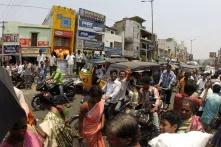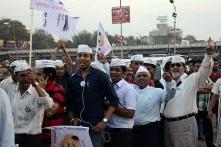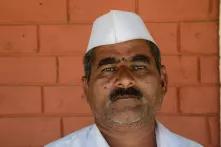
The Central Mall is one of the largest shopping centers in Pune, a city of 4 million people. Chic boutiques here offer international fashions at juicy prices, air-conditioned cafés entice people to chat and do business, and fine restaurants offer international specialties. Uniformed security guards monitor the entrances and ensure that beggars and paupers do not enter the palace of consumption. The fully air-conditioned mall is popular among young people from "better" families, who can live out their fantasies of a modern, westernized lifestyle here.
If you follow the narrow path on the long side of the mall, away from the main road, you enter a completely different world after just a few hundred meters. A sea of nested, tiny houses and rickety huts expands out directly behind the glittering shopping center. The haphazardly laid out paths are just wide enough for two people to pass each other; there is no space for cars. The apartments crowd each other, wall to wall, next to and above one another. A 10-square-meter room serves as a home for a four- to ten-member family. A common toilet – usually overcrowded and dirty – is reached only after a trek. Vegetable vendors and shopkeepers have settled in the few open spaces available.
Shanusham Waghmare is a dark-skinned woman with strong arms. Together with her husband, the 40-year-old lives in a blue-washed room on the edge of the shantytown. Waghmare is among the poorest of the poor. She survives on what others throw away. As a garbage collector, she must fight to survive from day to day. She rarely receives more than a euro for the paper scraps and plastic containers that she gathers in a day. Since she must be thrifty with every rupee, high inflation makes it difficult for her to survive. "Before, we could at least afford to eat a little meat everyday, but now we can only afford a chicken once a week!"
Waghmare considers herself a loyal supporter of the governing National Congress Party, but they have now deeply disappointed her. "They have been governing for years, but the things that one needs for daily life keeps getting more expensive. Of course I am going to vote again, but I will vote for the opposition this time because I want the conditions in our slum and the whole country to change." The desire for change is subdued by the widespread disillusionment with politics in general and especially with the politicians. Waghmare says, "A few politicians just want to make money. The make their promises in their campaigns, but we don't hear from them again after the election!"
Pradeep Jagtap is considered the political guru of the settlement. The 40-year-old paperboy lives in a tiny house on the slum's main square with this wife, two daughters and an elderly mother. There is a single room to cook, eat, watch television, and to sleep. "Most of the people here are barely interested in politics. They usually say, 'Nothing is going to change for us anyways, why should we still vote?'" But this time, a mood of deep disappointment with the incumbent government, shaping the desire for change can be felt everywhere, reports Pradeep Jagtap. "We want change, political change! The political establishment has sunken into corruption. We need new people now who will change things. The new Aam Aadmi Party is spreading hope for many people. Maybe they will also become corrupt at some point, but hopefully they will at least make things better at the beginning."
For Pradeep Jagtap, pervasive corruption is at the top of his list of problems that plague him and his country. The rich can live with that because they can easily afford to buy the necessary services from officials and politicians. But for the poor, bribery is a big obstacle. "At every public authority, one must bribe the officials. Without bribes, an application takes an eternity to process. Only those who pay the officials get his affairs settled. But I ask myself, 'Why should I have to pay extra money everywhere for a service that I am rightfully entitled to?'"
Corruption is everywhere, says Pradeep Jagtap. Every five years, when an election comes around, even the voters are bribed. Of course every politician promises wider streets, more schools and hospitals, and whatever else is included in the keyword "development." In addition to that, many candidates distribute generous gifts in the slums on the eve of the election. "Yes, that is normal here, and it has actually always been so," confirms Pradeep Jagtap. The candidates' aids distribute liquor, rice with meat, and money. Five hundred or even one thousand rupees is normal. "This happens secretly at night, but it happens. Where the money comes from, I don't know; it's probably dirty money."
Election campaigning ist passionate and unbridled like a rave party
Election campaigning in India is not for the faint hearted. It can be very passionate and unbridled, and sometimes also very rough. Monotone drum beats and sharp rallying cries stir up the crowd as if it were a rave party. Mingling in the crowd under these conditions is not always safe. The national elections always take place during the hottest season of the year because there is a pause in the field work at this time. Giving inflammatory speeches in temperatures hovering around 40 degrees Celsius is not easy for everyone. In addition to that, the parties' top staff in particular must overcome great distances in order to leave an impression in as many parts of the country as possible.
Paid party workers make sure that the candidates and their parties are recognized in the villages and towns. Colorful campaign posters decorate streets and squares. Young campaign workers organize motorcades with loud slogans and party flags to advertize for their candidates. New social media is playing a significant role for the first time in this election. Candidates are creating Facebook pages and sending campaign information over mobile phones. After all, every second Indian owns a mobile phone, and over 100 million citizens use the internet hangout Facebook.
Given the enormous ethnic and cultural diversity among the population, it is difficult for the parties to give precise details about their program. The manifestos published before the elections are usually overrun with generalities because they want to please everyone and not alienate any voter group. For the poor, inflation and corruption are the main concerns. The youth wants better education and career opportunities, and an end to corruption. Student Dakshata Nerula, like many of her friends, dressed in jeans and a t-shirt and blessed with a disarming smile, deplores the missing topic of women's rights in the campaign. "For me, the question of women's rights is an important criterion in the voting decision. None of the candidates have taken on the issue of security for women. Everyone talks about corruption, but nobody about women."
The student from a good family, who dreams of living in Germany one day and therefore has learned the German language, laments the male dominance in politics and berates the politicians across-the-board as "chauvinistic pigs." However, she is not a radical feminist. "The candidates' gender doesn't matter to me. I wouldn't vote for somebody just because she is a woman and I could maybe expect more security and protection from her. If a man is the better, more honest candidate, then I would vote for him."
While the poor and the middle-class demand an end to corruption, the wealthy have very different wishes. Industrialist Abhay Firodia, a stately man with a full beard and a sonorous voice, calls for a more liberal economic policy. "This election is a decision between socialism and the free market. We need a free market. Many politicians stoke conflict among the castes, between North and South, and between Hindus and Muslims, but they are only drawing attention away from the most important question: How can we develop India?"
From the perspective of industrialist Firodia, whose automobile company has worked with leading manufacturers in Germany for more than 30 years, pervasive corruption represents a lesser evil. Most of the candidates are very wealthy people who have sufficient financial resources to bear the high cost of campaigning on their own. They don't need his money says Firodia, but he also does not deny that entrepreneurs also bribe politicians. "It would be wrong to say that the business world doesn’t bribe politicians. Of course entrepreneurs pay politicians and officials so that new projects get approved and business operations can continue running. No businessman wants to pay, but the politicians exercise their power. And they can make things difficult for us, so it is useful to keep them in a good mood."
Since the string of corruption scandals that rocked the country and the government in recent years, the slogan "crony capitalism" or nepotism has been making the rounds. It describes how politicians and entrepreneurs ally themselves to plunder the country's resources – iron and coal deposits, land, mobile spectrum, etc. – for their own mutual benefit. Businessman Abhay Firodia vehemently distances himself from such terrible practices. As a solution, he recommends market liberalization.
Most citizens, in contrast, view "crony capitalism" as personal enrichment at the expense of the general public. Many feel cheated. "Who actually governs this land?" asks Pradeep Jagtap. "Ideally, the people should be governing, but in reality, a coalition of politicians and powerful business magnates call the shots in the country. The government does what the bosses want, not what the people want. That's why this election only has a limited significance for me."


